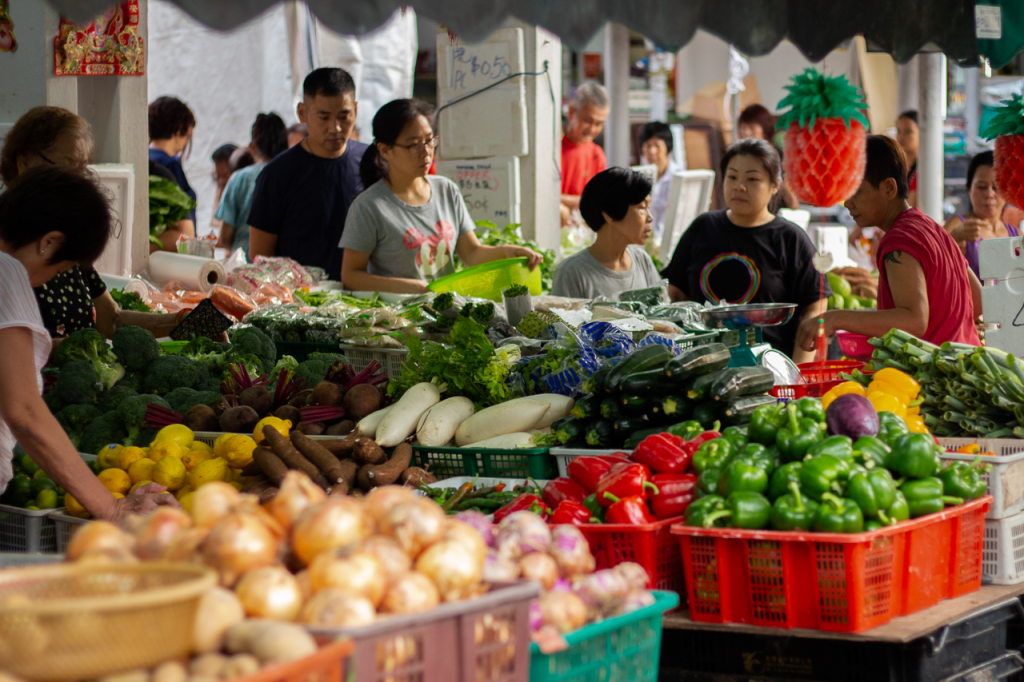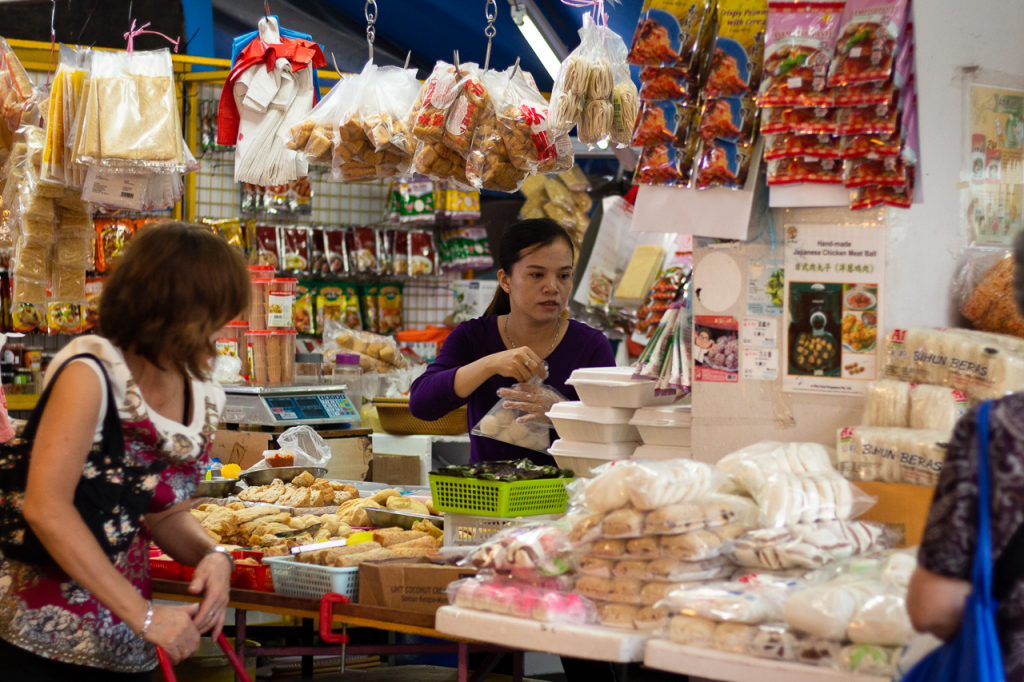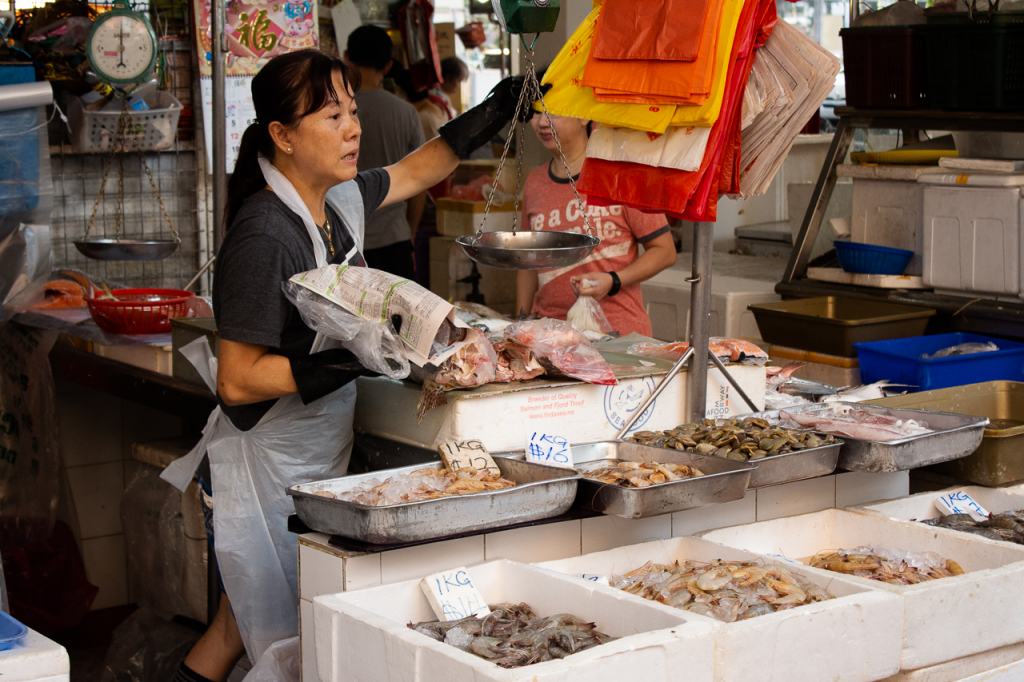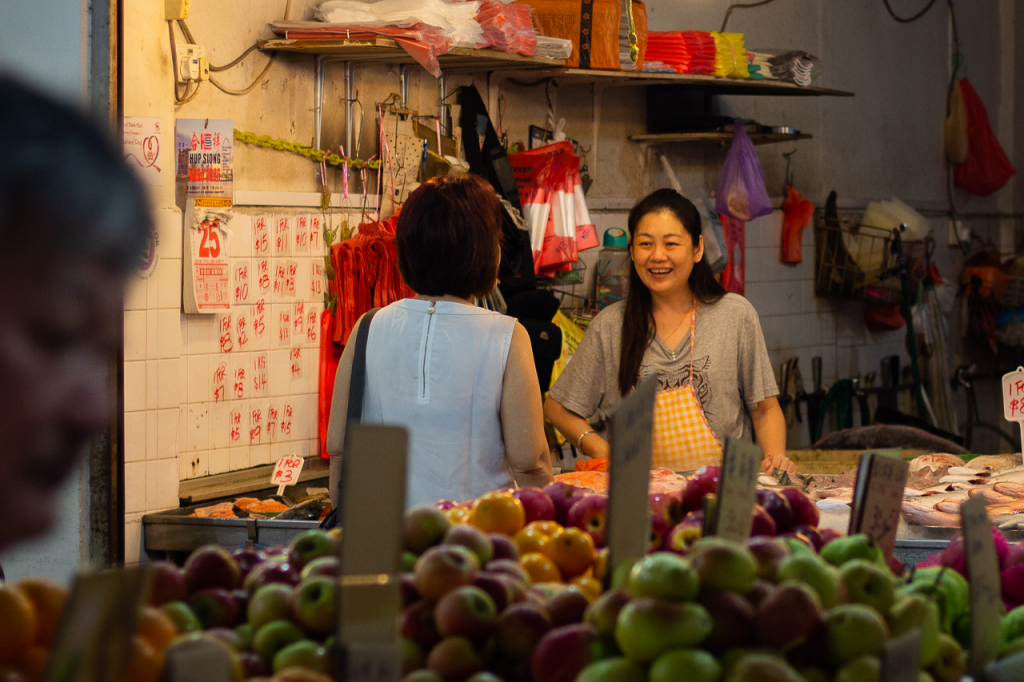All photos Rice file photos by Cheryl Tang.
I still spend obscene amounts of time looking at cereal, cheese, and yogurt. But of late, my thoughts have been turning to the wet market—the supermarket’s grimier, smellier, less endearing older sister, overshadowed on all fronts by shiny upmarket grocery stores, hipster farmers’ markets, and even the constant stream of angsty op-eds about the death of hawker culture.
At 26, I can count on one hand the number of times I’ve been to a wet market. Growing up, I’d accompanied my mother a few times, but did nothing more challenging than help carry our bags or fetch her a packet of cucumbers. Nowadays, as and when I need to buy any groceries, I get them at NTUC. The wet market is so far out of my comfort zone it might as well be in Mongolia.
And yet, I couldn’t shake the feeling that I was missing—or neglecting—something by leaving this territory unexplored. Foreign is usually synonymous with overseas, but here was a place at home I’d never truly ventured into, one which smelled of sea and earth and blood and all sorts of other discomforting things.
Against the manicured perfection of its supermarket sister, the wet market is strange and fascinating and, in some small, inexplicable way, terrifying. Which meant, naturally, that it was only a matter of time before I wanted to learn about it.

Over a chat on the patio of Candlenut, the Michelin-starred restaurant where she cut her teeth, Pam tells me about her own journey from wet market noob to seasoned veteran. To this sheltered, jiak kantang journalist, this makes her a member of an elite crew. Pam has the winsome sweetness of a kindergarten teacher, but there’s a don’t-fuck-with-me edge to her voice that emerges as she rhapsodises about markets.
“I was pretty passive when I went to the wet market with my mum as a kid,” says Pam. “Because she did all the bantering with the vendors, I didn’t really notice what she was doing or how to do it.”
“It was only when I began going with my colleague [from the now-defunct Lollapalooza] who would tell me, don’t be afraid to touch stuff, don’t be afraid to handle produce … don’t just assume that every fish is good, that’s not how you do it! You need to look at the gills, the eyes, feel it, is it firm? Even if the vendor is staring at you, you mustn’t be afraid. This is your right as a paying customer,” she says, voice hardening ever so slightly.
I nod along, mostly in awe and a little in fear. Pam, like me, probably gets called Xiao Mei (‘little sister’) enough that we might as well get our names changed, but she possesses the steely take-no-prisoners air of an auntie.
I pray for an ounce of her conviction to seep into me via conversational osmosis.
“Finding your feet in the wet market is a metaphor for finding your feet in life,” she continues.
“There’s hostility and intimidation, but if you can put your foot down and show that you can walk away if you need to, that you know how to go out and get what you want, you’ll be fine. This is a skill that the wet market teaches you—how to assert yourself. You know what I mean?”
Then she pauses and literally claps her hands.
“You should go marketing,” she says, enthusiasm lighting her features. “By yourself.”
I let out a peal of giggles that trails off into barely-disguised fear.

Speculation about the decline of wet markets always yields the same responses: They’re wet and messy. They smell. They’re only open in the morning, and don’t lend themselves to last-minute trips on the way home from work. You can buy most of the same stuff at NTUC anyway.
Moreover, given the time and effort involved, wet marketing only makes sense for the frequent cook. This rules out most under-35s; why go when you’re too busy, too reliant on take-away, or don’t have anyone to cook for; when you rarely step into the kitchen to begin with? In this, the drying up of wet markets is inseparable from broader questions around changing consumer preferences, dietary habits, and even cooking as a necessary life skill or marker of adulthood.
All of this, despite Pam’s zeal, doesn’t give me much confidence in the fate of the wet market. It’s true that we stand to lose plenty if they go—cheap, accessible, and fresh regional produce; their unique riot of sounds and smells and colours—but for millennials like myself, conditioned to reach for a pre-washed, hermetically-sealed bag of greens from NTUC, we won’t feel the loss of something we never valued in the first place.
And yet I feel, sure as salt, that I—we—will mourn wet markets if they disappear from our neighbourhoods. It’s like that song: don’t it always seem to go / that you don’t know what you got till it’s gone? We didn’t care about Golden Mile or the Sungei Road Thieves’ Market or Pearl Bank Apartments till the developers came calling, and then only then did the flurry of Facebook posts and ‘SAVE GOLDEN MILE’ petitions start.
Millennials are frequently derided for being apathetic, frivolous, and incapable of caring about anything beyond our next Instagram post. All of this is, obviously, crap. But in my more cynical moments, I do wonder if we deserve some disdain: rarely invested enough to keep our public spaces alive, but smug enough to decry ‘gentrification’ and ‘the erosion of true culture’ when they disappear.

“Right, okay. So first of all, you need to know which day and time to go. You need to get there by 7:00 AM for the good stuff, so actually we’re already late. You can’t go on Mondays because it will be closed. On weekends, go even earlier, because it will be crowded.”
“Then you need to know the days the vendors get new stock. Different vendors have different days and it varies with the market. This one is fine for vegetables, but for beef I go to Chinatown …”
I sit quietly next to her in the front seat, fighting the urge to take notes.
This continues all the way out of the car and into the market itself. My mother continues dispensing aphorisms like she’s re-writing the Analects.
“You must squeeze the tips of ladies’ fingers to check if they’re nice and soft.”
“If you’re making chicken curry, you need to buy the whole bird and clean it yourself. How are you supposed to wash pre-cut parts properly?”
“Don’t be like my friend. You can’t just walk up and go, like, gimme a fish to steam. You need to know what you want.”
Throughout all this, I hover meekly by her side, overwhelmed by the weight of everything I don’t know. I have so many questions (but what fish do I steam?) I barely know where to begin.
Inconvenience, an ‘uncool’ image, and alternative retail options are all legitimate threats to wet markets. But the biggest barrier to entry for me, at once both obvious and overlooked, is that true wet marketing—navigating the place with an auntie’s Teflon-coated confidence—takes skill.
Going to the supermarket takes no practice at all. Prices are openly displayed, everything is organised and labelled, and produce has been washed, screened, and packed into bags. It’s designed to be a mindless activity, which it is.
But knowing how to tell your snakehead from your snapper? Standing your ground against an annoyed vendor, giving you the stink-eye for checking his eggplants? Being able to distinguish cosmetic imperfections from actual rot? This only comes about through practice.
My mother has honed this through years of 6:30 AM Saturday starts, driving to Marine Terrace market at dawn to pick up the next week’s worth of groceries for my family. I’ve worked for a few years now, pay my own bills, and enjoy solo travel, but at the wet market, I am Xiao Mei: naive, untested, and completely clueless about how to buy a kilo of prawns.

Ten minutes into educating me on the finer points of choosing tau kee, my mum bumps into an old neighbour and they end up chatting for a few minutes. She waves to Kelvin, her retired ex-butcher who still hangs around the market, killing time by helping out at his old stall.
At the chicken stall, she tells the vendor that she just wants a carcass today, rather than her usual order. “If I don’t, he’ll prepare it the normal way because he knows me.”
I recall something Pam described: that the heart of the wet market lies in the personal relationship between vendor and customer, even if they only know each other by face and order, rather than by name. As my mum and I wait for the butcher to bag the carcass, gazing distractedly at a basket of discarded chicken parts, her voice filters back into my head.
“In most cities overseas, there’ll be one major market in the city, and smaller pop-up markets here and there, but in Singapore, there’s one in every neighbourhood … it’s not even like there’s one in Ang Mo Kio, there’ll be a few. It’s so localised and unique. And by having this proximity to people’s houses, the direct connection with vendors, it promotes this sense of community and belonging.”
“You don’t have to say a single word at the supermarket. Everything’s stated there for you, there are even self-checkout machines, it’s totally transactional. But the wet market is always mutual.”

My shopping list is short and manageable—minced pork, eggs, spinach, wing beans, dragonfruit, soursop; no next-level purchases like seafood. Nonetheless, I can’t help but feel a little nervous, as though I’m about to take a test I haven’t fully prepared for.
This is stupid, I tell myself. It’s just going to the market, not quantitative finance.
The chorus of ‘Xiao Mei’ begins as I tentatively approach the stalls, passing the fishmongers on my way to the butcher. The vendors call out to me, beckoning me to examine their haul, asking what I’m looking for. All the other patrons look to be either domestic helpers or over 40. I wonder if they can smell my uncertainty.
But after all that build-up, anxiety, and research, my first trip goes … fine.
There is no fuss or panic. I stride past the fishmongers, smile at the butcher, and pay for my minced pork without incident. There is some confusion at the vegetable stall about what variety of spinach to buy, but the auntie patiently points me to the yin choi. My biggest (small) win comes when I sort through the packets of wing beans, frowning at how the edges have gone dark and a little sad; the vegetable seller insists they’re fine, pushing aside the top layer of bags to show me the equally wilted ones beneath.
I recall what Pam said—remember you are a paying customer!—and shamelessly move on to the next stall.
Truth be told, it all feels a little anticlimactic, after Pam’s enthusiasm and my mother’s dictums. It’s also a somewhat solitary experience; I don’t expect to feel the ren qing wei (human warmth) which has taken them years to years to nurture, and indeed I don’t. How could I, when I don’t know the vendors, and they don’t know me?
And yet: I go to the supermarket to be alone—to take my aspirations and anxieties for a walk, untroubled by mess or disorder or other human beings. This is impossible to do at the wet market. You cannot show up and expect to feel at home in the world, negotiating, examining, questioning, bantering. But home is something you build for yourself; it’s something you have to earn.
The truth of it is, my (slightly unwarranted) terror of wet marketing was never just about having to buy groceries in Mandarin. It was about learning to grow up; learning to grapple with blood and guts and bone and gristle and the muck of everyday life. And this was never going to happen, at least not in the space of a single trip. Xiao Mei was never going to blossom into a confident, hard-assed, Nigella-Lawson-meets-Violet-Oon domestic goddess/auntie hybrid upon buying her first 500g of minced pork.
But it was a start. You cannot value culture, or celebrate it on its own terms, without learning to recognise its place in your own life; defining anew that little niche where the personal meets the public and the familiar overlaps with the foreign. And so it was with marketing. I dipped my toes in the water and realised I needed to get my whole body wet.
Wanna go marketing together? Hit us up at community@ricemedia.co.







